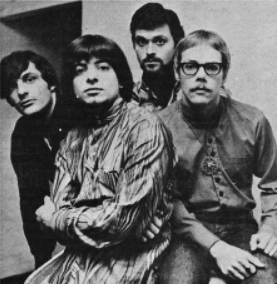
Vanilla Fudge is an American rock band known predominantly for their slow extended heavy rock arrangements of contemporary hit songs, such as their hit cover of the Supremes' "You Keep Me Hangin' On".
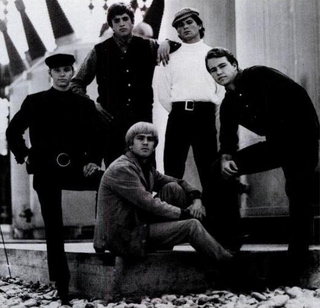
The Electric Prunes are an American psychedelic rock band, formed in Los Angeles, California, in 1965. Much of the band's music was, as music historian Richie Unterberger described it, possessed of "an eerie and sometimes anguished ambiance." Their most successful material was by songwriters Annette Tucker and Nancie Mantz, though the group also penned their own songs. Incorporating psychedelia and elements of embryonic electronic rock, the band's sound was marked by innovative recording techniques with fuzz-toned guitars and oscillating sound effects. In addition, guitarist Ken Williams' and singer James Lowe's concept of "free-form garage music" provided the band with a richer sonic palette and exploratory lyrical structure than many of their contemporaries.

Steppenwolf was a Canadian-American rock band that was prominent from 1968 to 1972. The group was formed in late 1967 in Los Angeles by lead singer John Kay, keyboardist Goldy McJohn, and drummer Jerry Edmonton, all formerly of the Canadian band the Sparrows. Guitarist Michael Monarch and bass guitarist Rushton Moreve were recruited via notices placed in Los Angeles-area record and musical instrument stores.

Happy Mondays are an English rock band formed in Salford in 1980. The original line-up was Shaun Ryder (vocals), his brother Paul Ryder (bass), Gary Whelan (drums), Paul Davis (keyboard), and Mark Day (guitar). Mark "Bez" Berry later joined the band onstage as a dancer/percussionist. Rowetta joined as a second vocalist in 1990. They were initially signed to Tony Wilson's Factory Records label.

Pretty Things were an English rock band formed in September 1963 in Sidcup, Kent, taking their name from Bo Diddley's 1955 song "Pretty Thing", and active in their first incarnation until 1971. They released five studio albums, including the debut The Pretty Things and S. F. Sorrow, four EPs and 15 UK singles, including the Top 20 UK Singles Chart "Don't Bring Me Down" and "Honey I Need". They reformed later in 1971 and continued through to 1976 issuing three more studio albums, and reformed once again from 1979 to 2020 releasing another five studio albums finalising with Bare as Bone, Bright as Blood.
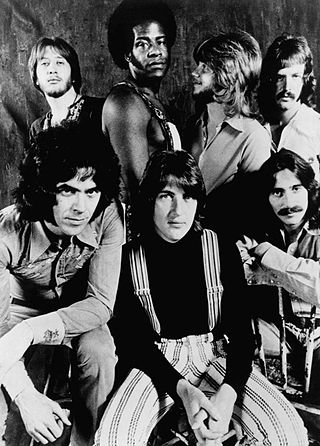
Three Dog Night is an American rock band formed in 1967, founded by vocalists Chuck Negron, Cory Wells, and Danny Hutton. This lineup was soon augmented by Jimmy Greenspoon (keyboards), Joe Schermie (bass), Michael Allsup (guitar), and Floyd Sneed (drums). The band had 21 Billboard Top 40 hits between 1969 and 1975, with three hitting number one. Three Dog Night recorded many songs written by outside songwriters, and they helped to introduce mainstream audiences to writers such as Randy Newman, Paul Williams, and Hoyt Axton.
Acid rock is a loosely defined type of rock music that evolved out of the mid-1960s garage punk movement and helped launch the psychedelic subculture. While the term has sometimes been used interchangeably with "psychedelic rock", acid rock also specifically refers to a more musically intense, rawer, or heavier subgenre or sibling of psychedelic rock. Named after lysergic acid diethylamide (LSD), the style is generally defined by heavy, distorted guitars and often contains lyrics with drug references and long improvised jams.
BR549 was an American country rock band founded in 1993. It originally consisted of Gary Bennett, Don Herron, "Smilin'" Jay McDowell, Chuck Mead, and "Hawk" Shaw Wilson. Bennett and McDowell left the band in 2001, with Chris Scruggs and Geoff Firebaugh respectively replacing them. Both Firebaugh and Scruggs later left the band as well; Mark Miller has become the band's third bassist. The name of the band is taken from a mangled phone number from Hee Haw comedian Junior Samples' car salesman skit.

Mass in F Minor is the third studio album by American rock band The Electric Prunes, released in 1968. It consists of a musical setting of the mass sung in Latin and Greek and arranged in the psychedelic style of the band, and was written and arranged by David Axelrod.

Poi Dog Pondering is an American musical group which is noted for its cross-pollination of diverse musical genres, including various forms of acoustic and electronic music. Frank Orrall founded the band in Hawaii in 1984, initially as a solo project. In 1985 Orrall formed the first line-up of PDP to perform its first concert at the Honolulu Academy of Arts. The band embarked on a yearlong street performance busking tour across North America. They eventually settled down in Austin, Texas in 1987, where they recorded their first three albums. In 1992, the band relocated to Chicago and they began to incorporate orchestral arrangements and elements of electronic, house music, and soul music into their acoustic rock style. The membership of Poi Dog Pondering has evolved from album to album, with Frank Orrall being a constant player since the inception of the band.

The West Coast Pop Art Experimental Band (WCPAEB) was an American psychedelic rock band formed in Los Angeles, California, in 1965. The group created music that possessed an eerie, and at times sinister atmosphere, and contained material that was bluntly political, childlike, and bizarre. Representing different musical backgrounds among band members, the group, at times, resembled a traditional Byrds-esque folk rock ensemble, but the WCPAEB also, within the same body of work, recorded avant-garde music marked by multi-layered vocal harmonies.

Underground is the second studio album by the American garage rock band, The Electric Prunes, and was released in 1967 on Reprise Records. It would be the final album of any materialized input by band members until the 1969 "New Improved" Electric Prunes were formed. The album was a moderate chart hit, but, without a hit-ready single, the band could not repeat their past success.

Release of an Oath is the fourth studio album credited to The Electric Prunes, released in 1968. It was composed and arranged by David Axelrod, and band members played little part in its recording. The work follows the musical pattern of their Mass in F Minor, also composed by Axelrod.
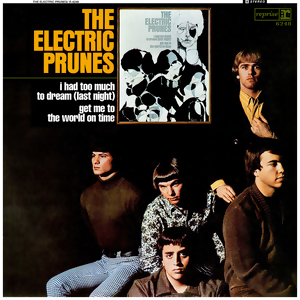
The Electric Prunes, sometimes referred to as I Had Too Much to Dream (Last Night), is the 1967 debut album by the American garage rock band, the Electric Prunes, released on Reprise Records. The first track, "I Had Too Much to Dream (Last Night)", was a hit and became the band's signature tune. The album also contains another notable psychedelic rock composition, "Get Me to the World on Time". The album was listed in the book 1001 Albums You Must Hear Before You Die.
Detroit was a spinoff of rock group The Detroit Wheels. This revised version of that band was formed by Mitch Ryder as a successor to The Wheels in 1970. The only original Wheel in the group was the drummer Johnny "Bee" Badanjek; other members were guitarists Steve Hunter and Brett Tuggle, organist Harry Phillips and bassists W.R. Cooke and John Sauter. A single album was released by this grouping, a 1971 self-titled LP issued on Paramount Records. They had a hit with their version of the Lou Reed - penned song "Rock & Roll", which Reed liked enough to ask Steve Hunter to join his backing band. Ryder quit the group because of voice problems in 1972, and Detroit vocalist Rusty Day took over his spot; without Ryder, the group floundered, and eventually broke up in 1974.
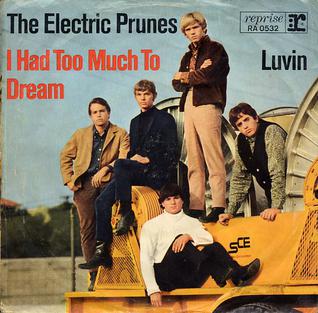
"I Had Too Much to Dream (Last Night)" is a song written with music by Annette Tucker and lyrics by Nancie Mantz, which was recorded in late 1966 by the garage rock band The Electric Prunes. Released as the band's second single, it reached number 49 in the UK and peaked at number 11 on the Billboard Hot 100 the week ending February 11, 1967.
Peter Charles Lewis is one of the founding members of the band Moby Grape. Three of his better known songs with Moby Grape are "Fall on You" and "Sitting by the Window" from the self-titled first Moby Grape album and "If You Can't Learn from My Mistakes" from Moby Grape '69.

The Astronauts was an American rock band, which had a minor hit in 1963 with "Baja" and remained successful for several years, especially in Japan. They have been described as being, "along with...(the) Trashmen, the premier landlocked Midwestern surf group of the '60s." For most of their career, the band members were Rich Fifield, Jon "Storm" Patterson, Bob Demmon, Dennis Lindsey, and Jim Gallagher.

"Get Me to the World on Time" is a song written by Annette Tucker and Jill Jones for the American garage rock band, The Electric Prunes. The song was released in May 1967 following the success of the band's previous single, "I Had Too Much to Dream ". Although the follow-up did not have the same success, "Get Me to the World on Time" still charted at number 27 on the Billboard Hot 100. The single also fared slightly better in the UK, where it reached number 42.

The Genesis of Slade is a compilation album of pre-Slade era recordings by British rock band Slade. It was first released in 1996 by The Music Corporation and was later re-issued by Cherry Red in 2000.
















